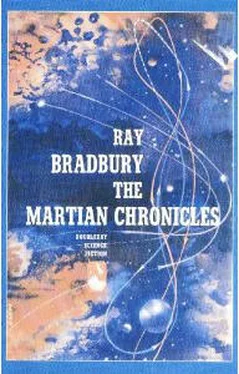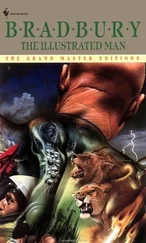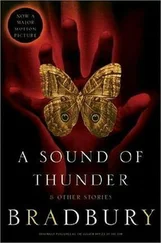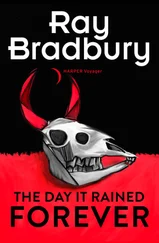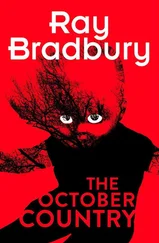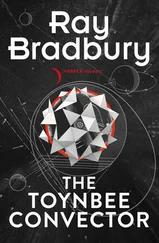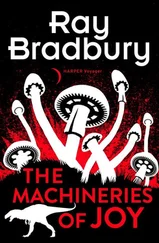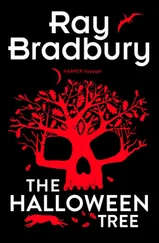“You know the law. Strict to the letter. No books, no houses, nothing to be produced which in any way suggests ghosts, vampires, fairies, or any creature of the imagination.”
“You’ll be burning Babbitts next!”
“You’ve caused us a lot of trouble, Mr. Stendahl. It’s in the record. Twenty years ago. On Earth. You and your library.”
“Yes, me and my library. And a few others like me. Oh, Poe’s been forgotten for many years now, and Oz and the other creatures. But I had my little cache. We had our libraries, a few private citizens, until you sent your men around with torches and incinerators and tore my fifty thousand books up and burned them. Just as you put a stake through the heart of Halloween and told your film producers that if they made anything at all they would have to make and remake Earnest Hemingway. My God, how many times have I seen For Whom the Bell Tolls done! Thirty different versions. All realistic. Oh, realism! Oh, here, oh, now, oh hell!”
“It doesn’t pay to be bitter!”
“Mr. Garrett, you must turn in a full report, mustn’t you?”
“Yes.”
“Then, for curiosity’s sake, you’d better come in and look around. It’ll take only a minute.”
“All right. Lead the way. And no tricks. I’ve a gun with me.”
The door to the House of Usher creaked wide. A moist wind issued forth. There was an immense sighing and moaning, like a subterranean bellows breathing in the lost catacombs.
A rat pranced across the floor stones. Garrett, crying out, gave it a kick. It fell over, the rat did, and from its nylon fur streamed an incredible horde of metal fleas.
“Amazing!” Garrett bent to see.
An old witch sat in a niche, quivering her wax hands over some orange-and-blue tarot cards. She jerked her head and hissed through her toothless mouth at Garrett, tapping her greasy cards.
“Death!” she cried.
“Now that’s the sort of thing I mean,” said Garrett. “Deplorable!”
“I’ll let you burn her personally.”
“Will you, really?” Garrett was pleased. Then he frowned. “I must say you’re taking this all so well.”
“It was enough just to be able to create this place. To be able to say I did it. To say I nurtured a medieval atmosphere in a modern, incredulous world.”
“I’ve a somewhat reluctant admiration for your genius myself, sir.” Garrett watched a mist drift by, whispering and whispering, shaped like a beautiful and nebulous woman. Down a moist corridor a machine whirled. Like the stuff from a cotton-candy centrifuge, mists sprang up and floated, murmuring, in the silent halls.
An ape appeared out of nowhere.
“Hold on!” cried Garrett.
“Don’t be afraid,” Stendahl tapped the animal’s black chest. “A robot. Copper skeleton and all, like the witch. See?” He stroked the fur, and under it metal tubing came to light.
“Yes.” Garrett put out a timid hand to pet the thing. “But why, Mr. Stendahl, why all this? What obsessed you?”
“Bureaucracy, Mr. Garrett. But I haven’t time to explain. The government will discover soon enough.” He nodded to the ape. “All right. Now .”
The ape killed Mr. Garrett.
“Are we almost ready, Pikes?”
Pikes looked up from the table. “Yes, sir.”
“You’ve done a splendid job.”
“Well, I’m paid for it, Mr. Stendahl,” said Pikes softly as he lifted the plastic eyelid of the robot and inserted the glass eyeball to fasten the rubberoid muscles neatly. “There.”
“The spitting image of Mr. Garrett.”
“What do we do with him, sir?” Pikes nodded at the slab where the real Mr. Garrett lay dead.
“Better burn him, Pikes. We wouldn’t want two Mr. Gasretts, would we?”
Pikes wheeled Mr. Garrett to the brick incinerator. “Goodby.” He pushed Mr. Garrett in and slammed the door.
Stendahl confronted the robot Garrett. “You have your orders, Garrett?”
“Yes, sir.” The robot sat up. “I’m to return to Moral Climates. I’ll file a complementary report. Delay action for at least forty-eight hours. Say I’m investigating more fully.”
“Right, Garrett. Good-by.”
The robot hurried out to Garrett’s rocket, got in, and flew away.
Stendahl turned. “Now, Pikes, we send the remainder of the invitations for tonight. I think we’ll have a jolly time, don’t you?”
“Considering we waited twenty years, quite jolly!”
They winked at each other.
Seven o’clock. Stendahl studied his watch. Almost time. He twirled the sherry glass in his hand. He sat quietly. Above him, among the oaken beams, the bats, their delicate copper bodies hidden under rubber flesh, blinked at him and shrieked. He raised his glass to them. “To our success.” Then he leaned back, closed his eyes, and considered the entire affair. How he would savor this in his old age. This paying back of the antiseptic government for its literary terrors and conflagrations. Oh, how the anger and hatred had grown in him through the years. Oh, how the plan had taken a slow shape in his numbed mind, until that day three years ago when he had met Pikes.
Ah yes, Pikes. Pikes with the bitterness in him as deep as a black, charred well of green acid. Who was Pikes? Only the greatest of them all! Pikes, the man of ten thousand faces, a fury, a smoke, a blue fog, a white rain, a bat, a gargoyle, a monster, that was Pikes! Better than Lon Chaney, the father? Stendabi ruminated. Night after night he had watched Chaney in the old, old films. Yes, better than Chaney. Better than that other ancient mummer? What was his name? Karloff? Far better! Lugosi? The comparison was odious! No, there was only one Pikes, and he was a man stripped of his fantasies now, no place on Earth to go, no one to show off to. Forbidden even to perform for himself before a mirror!
Poor impossible, defeated Pikes! How must it have felt, Pikes, the night they seized your films, like entrails yanked from the camera, out of your guts, dutching them in coils and wads to stuff them up a stove to burn away! Did it feel as bad as having some fifty thousand books annihilated with no recompense? Yes. Yes. Stendahl felt his hands grow cold with the senseless anger. So what more natural than they would one day talk over endless coffeepots into innumerable midnights, and out of all the talk and the bitter brewings would come — the House of Usher.
A great church bell rang. The guests were arriving.
Smiling he went to greet them.
Full grown without memory, the robots waited. In green silks the color of forest pools, in silks the color of frog and fern, they waited. In yellow hair the color of the sun and sand, the robots waited. Oiled, with tube bones cut from bronze and sunk in gelatin, the robots lay. In coffins for the not dead and not alive, in planked boxes, the metronomes waited to be set in motion. There was a smell of lubrication and lathed brass. There was a silence of the tomb yard. Sexed but sexless, the robots. Named but unnamed, and borrowing from humans everything but humanity, the robots stared at the nailed lids of their labeled F.O.B. boxes, in a death that was not even a death, for there had never been a life. And now there was a vast screaming of yanked nails. Now there was a lifting of lids. Now there were shadows on the boxes and the pressure of a hand squirting oil from a can. Now one clock was set in motion, a faint ticking. Now another and another, until this was an immense clock shop, purring. The marble eyes rolled wide their rubber lids. The nostrils winked. The robots, clothed in hair of ape and white of rabbit, arose: Tweedledum following Tweedledee, Mock-Turtle, Dormouse, drowned bodies from the sea compounded of salt and whiteweed, swaying; hanging blue-throated men with turned-up, clam-flesh eyes, and creatures of ice and burning tinsel, loam-dwarfs and pepper-elves, Tik-tok, Ruggedo, St. Nicholas with a self-made snow flurry blowing on before him, Bluebeard with whiskers like acetylene flame, and sulphur clouds from which green fire snouts protruded, and, in scaly and gigantic serpentine, a dragon with a furnace in its belly reeled out the door with a scream, a tick, a bellow, a silence, a rush, a wind. Ten thousand lids fell back. The clock shop moved out into Usher. The night was enchanted.
Читать дальше
